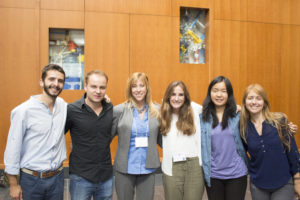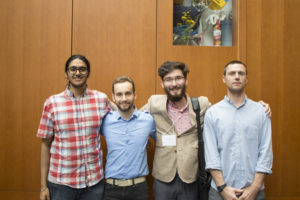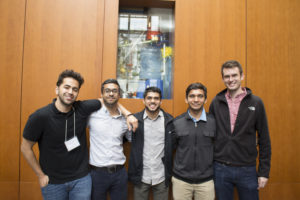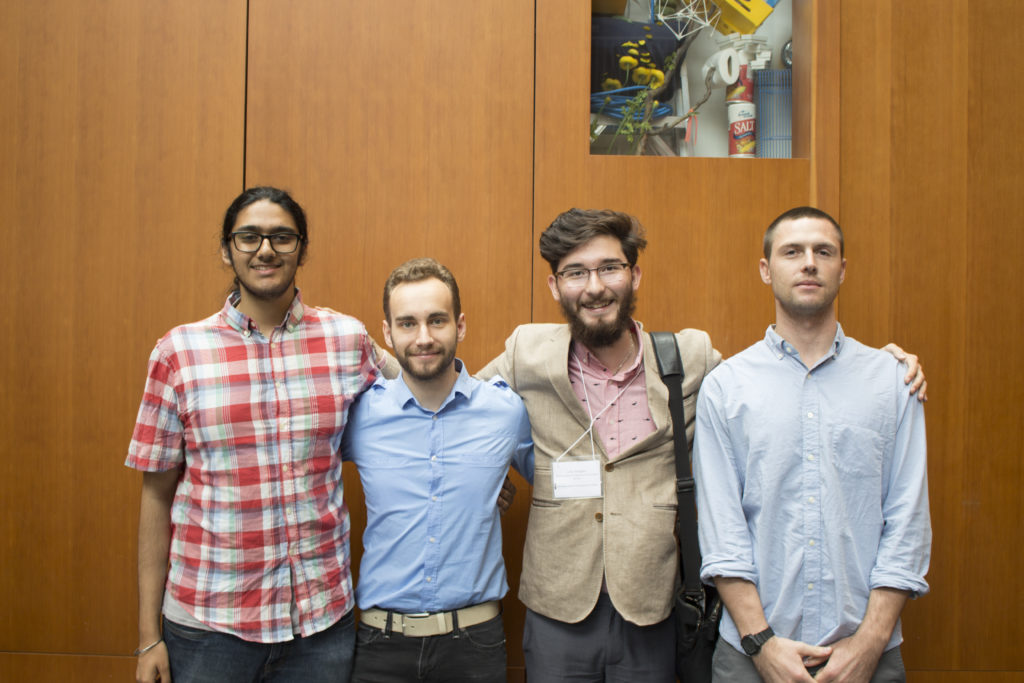The Berkeley Method of Entrepreneurship Bootcamp Winners Announced
It has been an amazing week of collision of Berkeley students and global entrepreneurs, mentors, and academics at our Berkeley Method of Entrepreneurship bootcamp. At the bootcamp students develop ideas from scratch or gain advice, mentorship, and scholarship to help them advance a pre-existing idea. Students from engineering, business, and social science joined the week-long event to not only form teams and develop ideas for startups, but to learn the Berkeley Method of Entrepreneurship, the Sutardja Center’s unique approach that emphasizes mindset, networking and the entrepreneurial journey as well as the traditional approach to learning entrepreneurship through the study of frameworks and cases.
Overall, eighteen teams competed in the semifinal pitch competition and three teams competed in the finals. The winning team was Team MIR with their idea for a new kind of drone that will help make drone parcel delivery a reality.
1st place – MIR
Problem: It costs too much for the last mile of parcel delivery, drones currently can only do one package at once.
Solution: Use a drone that can carry more weight than current drones, to deliver more packages cheaply for the last mile
Business model: Selling drone and software solution to delivery networks (UPS, FedEx, etc.)
Market size: $20 billion global market, $6 billion in use.
2nd place (tie) – ACES
Problems: 1) large airplane manufacturers (AirBus, Boeing) currently waste tons of carbon fiber and 2) Carbon fiber bikes are too expensive for most consumers.
Solution: Use this waste to create high quality carbon fiber bicycles that currently cost $5,000 for only around $700
Business model: Offer personalized bicycles through online site
Market size: $1 billion global bicycle industry

Team ACES: Pedro Canizares, Francisco Fernandez, Mentor Tamra Teig, Fatima Abaurrea Castro, Nancy Li, Nicole Martinez, Not Pictured Sriya Srinath
2nd place (tie) – MetriX
“Digital metrics for the physical world”
Problems: Advertising in malls and public shopping areas and stores is not very relevant to most consumers.
Solution: Use location services to track where consumers spend most of their time in a store (e.g. in the ice cream isle) and then offer them relevant display advertisements.
Business model: Partner with malls and large department stores to offer subscription service for their devices and platform
Market size: $33 billion addressable market
It has been an amazing week of collision of Berkeley students and global entrepreneurs, mentors, and academics at our Berkeley Method of Entrepreneurship bootcamp. At the bootcamp students develop ideas from scratch or gain advice, mentorship, and scholarship to help them advance a pre-existing idea. Students from engineering, business, and social science joined the week-long event to not only form teams and develop ideas for startups, but to learn the Berkeley Method of Entrepreneurship, the Sutardja Center’s unique approach that emphasizes mindset, networking and the entrepreneurial journey as well as the traditional approach to learning entrepreneurship through the study of frameworks and cases.
Overall, eighteen teams competed in the semifinal pitch competition and three teams competed in the finals. The winning team was Team MIR with their idea for a new kind of drone that will help make drone parcel delivery a reality.
1st place – MIR
Problem: It costs too much for the last mile of parcel delivery, drones currently can only do one package at once.
Solution: Use a drone that can carry more weight than current drones, to deliver more packages cheaply for the last mile
Business model: Selling drone and software solution to delivery networks (UPS, FedEx, etc.)
Market size: $20 billion global market, $6 billion in use.
2nd place (tie) – ACES
Problems: 1) large airplane manufacturers (AirBus, Boeing) currently waste tons of carbon fiber and 2) Carbon fiber bikes are too expensive for most consumers.
Solution: Use this waste to create high quality carbon fiber bicycles that currently cost $5,000 for only around $700
Business model: Offer personalized bicycles through online site
Market size: $1 billion global bicycle industry

Team ACES: Pedro Canizares, Francisco Fernandez, Mentor Tamra Teig, Fatima Abaurrea Castro, Nancy Li, Nicole Martinez, Not Pictured Sriya Srinath
2nd place (tie) – MetriX
“Digital metrics for the physical world”
Problems: Advertising in malls and public shopping areas and stores is not very relevant to most consumers.
Solution: Use location services to track where consumers spend most of their time in a store (e.g. in the ice cream isle) and then offer them relevant display advertisements.
Business model: Partner with malls and large department stores to offer subscription service for their devices and platform
Market size: $33 billion addressable market



